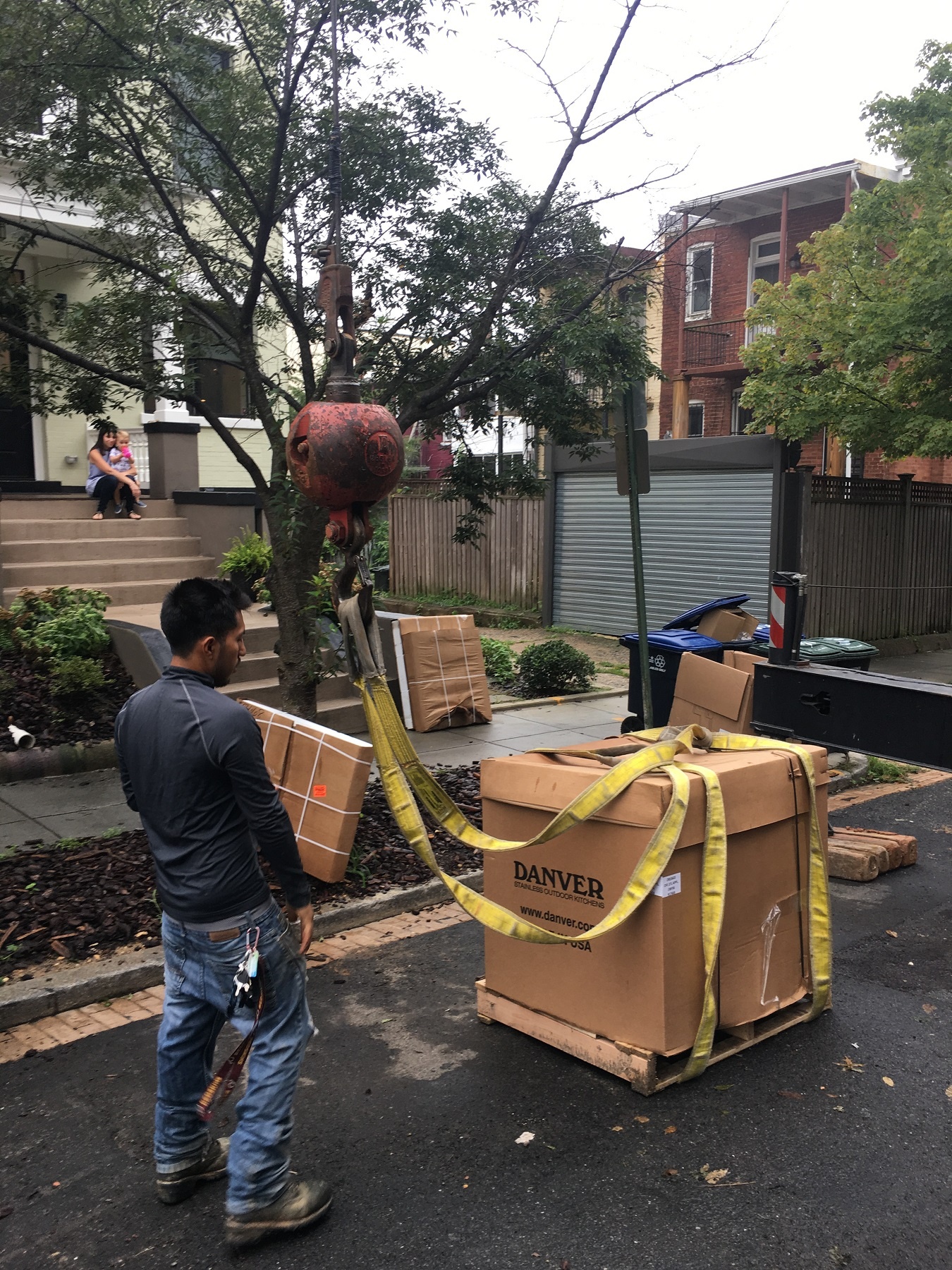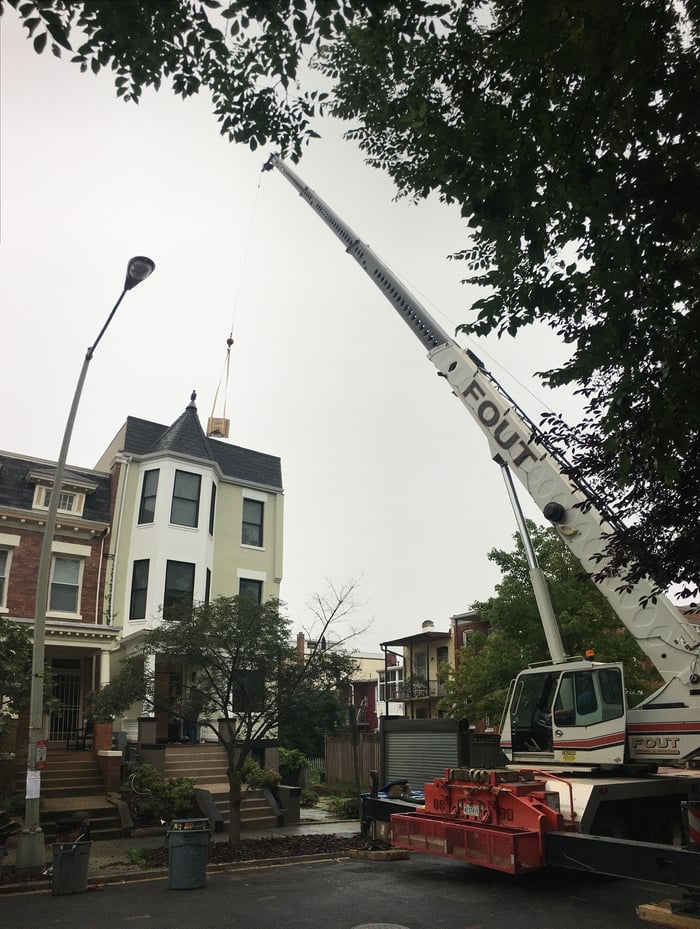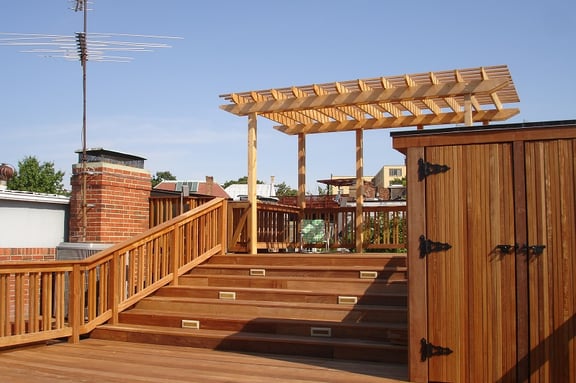.jpg?width=1800&name=rooftop%20deck%20baltimore%20bab%20(4).jpg)
Why Cranes Are a Necessity for Rooftop Deck Builders and Deck Projects
If you’re considering a rooftop deck addition, you might be wondering about the logistics of how your build firm will get all those materials to the roof itself. If you’re curious about how this process works, you’re not alone. Rooftop decks present some very unique challenges for builders. it’s important to understand the logistical and financial ramifications of hauling all those heavy materials to your roof.
Access Is Key
The first important thing to understand about the process of building a rooftop deck is that access is often limited, and that makes every aspect of the build more time consuming, complicated, and challenging. With rooftop decks, builders are often working twenty to thirty feet in the air, and getting everything needed to complete a build up two or three stories is simply more difficult than a comparable job on the ground level.
Access, therefore, is key to a job going smoothly and as planned. In the best-case scenario, the job site allows for a crane to simply lift the items up to the roof. A crane, however, comes with its own set of challenges and expenses.

Obtaining a Crane: A Step-by-Step Breakdown
Securing a crane rental is possible and oftentimes necessary, but the process is involved. The necessary steps are as follows:
-
Contact the crane company.
Contact the crane company with your needs to get an idea of what sized crane to rent, when scheduling is possible and other crucial elements related to your project. In most cases, your licensed, bonded, and insured deck contractor will handle this step for you.
We have had great experiences with Fout Crane and Rigging, a crane operator that services the DMV as well as West Virginia, but do your due diligence in vetting any company you are considering business; it is crucial to have a reliable crane company given the extensive preparation, timing, and costs involved with planning a crane rental.
-
Verify you can use a crane in your area.
If trees, power lines, or any other obstacle will impede the crane, the job site simply might not be conducive to this kind of equipment. It’s best to know this as early in the process as possible because it could seriously delay or even stop a job.
-
Obtain a road closure permit.
While the crane is being operated, the road must be closed for safety reasons. You’ll also need qualified people monitoring the sidewalks to ensure no pedestrians or cyclists enter the area, and others will need to be directing traffic.
Considering all the people, labor, and material involved in a crane rental, it usually comes out to about $500 per hour as the cost of renting a crane for a rooftop deck project. Using that as your guideline, a full eight-hour day crane rental can cost a homeowner about $4,000. Keep in mind, this is just for the rental; that figure doesn’t include materials or the labor for actually constructing the rooftop deck.

What Can I Do to Minimize the Crane Rental Cost?
If you’re going to move forward with a crane rental, you want to do everything in your power to minimize the associated costs. That means being as prepared as possible on the day of the rental. Obviously, you don’t want any delays because once the crane is there, you’re on the clock.

Make sure everything in the surrounding area and work space is clear and ready to go, and ensure everyone is on time and in position to direct traffic, to divert people from the sidewalk, and to unload materials to the roof.
While these steps help ensure you don’t rack up unnecessary hours with the crane, you must be realistic and prepared for the cost before starting. A rooftop deck can cost two to three times the price of a ground-level deck, with startup costs easily in the neighborhood of $10,000. This is due to costly equipment rental, but it’s also because work is simply less productive and efficient in a rooftop environment. Space is confined, and workers must constantly be going up and down several stories to complete the work.
One note, when you’re bidding out these projects, you’ll almost certainly be looking for ways to minimize cost, but be wary about any bid that’s significantly lower than those from other build firms. Keeping costs minimal is important, but not if it comes at the expense of safety or building code compliance.
Other Considerations with a Crane Rental
Crane rental comes with some ancillary challenges that should be considered as well. For example, you should take into account the impact of this project (and road closure) on your neighborhood. People affected by the closure will certainly be inconvenienced and potentially angry, and these are people you still have to live near after the project is complete!
Crane rental is also an involved and potentially dangerous undertaking. You’ll need experienced people working every facet of the job, from those hooking up the equipment from the rooftop to those watching for walkers and drivers below. Only go with build firms experienced in this kind of work.
The last thing to keep in mind is the possibility that a crane rental simply isn’t possible in your building location. If there are unmovable obstacles that make the crane not feasible, this can actually nix a project. Before you invest any money into your rooftop deck, confirm the project can actually be completed.
A rooftop deck can be a fantastic addition to any Washington, DC, home, but it definitely comes with some added logistical challenges. Make sure you’re prepared for the cost, the disruption of a crane rental, and the extra time a project of this nature will take. If you go in with realistic expectations about those three issues, you’re much better prepared for a positive and seamless construction project.

